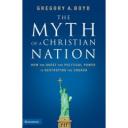The Myth of a Christian Nation…
 The Myth of a Christian Nation: How the quest for political power is destroying the church arrived this week. (Only have read the introduction so far. Let me lay out why this book is an important read for Christians (HT Karissa). Here is the thesis of the book:
The Myth of a Christian Nation: How the quest for political power is destroying the church arrived this week. (Only have read the introduction so far. Let me lay out why this book is an important read for Christians (HT Karissa). Here is the thesis of the book:
I believe a significant segment of American evangelicalism is guilty of nationalistic and political idolatry. To a frightful degree, I think, evangelicals fuse the kingdom of God with a preferred version of the kingdom of the world (whether it’s our national interests, a particular form of government, a particular program, or so on).
In April of 2004, Greg Boyd began to preach a series of sermons entitled “The Cross and the Sword.” The series was in response to a well-oiled partnership between right-wing political organizations and evangelicals. Boyd reports that this alliance between church and politics was putting pressure on pastors to promote particular candidates and issues as those that Christians should support. Boyd wanted to expose the danger of associating the Christian faith too closely with any political point of view, whether conservative or liberal. When he preached this series of sermons, about 20 percent of his congregation (roughly a thousand people) left the church.
I admire Boyd’s courage to preach the Gospel of the Kingdom of God and to challenge the flawed assumptions that have led to political and nationalistic idolatry in the church. I admire his courage in speaking prophetically to the assumption held many Christians that there is little ambiguity in how true Christian faith translates into politics. Here is the rubric applied within broad segments of evangelical Christianity:
Since God is against abortion, Christians should vote for the pro-life candidate. Since God is against homosexuality, Christians should vote for the candidate who supports the marriage ammendment act. Since God is for personal freedom, Christians should vote for the candidate who will fulfill “America’s mission” to bring freedom to the world.
Boyd provides a needed response to this too simple rubric:
For some evangelicals, the kingdom of God is largely about, if not centered on, “taking America back for God,” voting for the Christian candidate, outlawing abortion, outlawing gay marriage, winning the culture war, defending political freedom at home and abroad, keeping the phrase ‘under God’ in the Pledge of Allegiance, fighting for prayer in public schools and at public events, and fighting to display the Ten Commandments in government buildings.
I will argue that this perspective is misguided, that fusing together the kingdom of God with this or any other version of the kingdom of the world is idolatrous and that this fusion is having serious consequences for Christ’s church and for the advancement of God’s kingdom.
How has the myth of a Christian nation hurt the cause of the gospel?
For many in America and around the world, the American flag has smothered the glory of the cross, and the ugliness of our American version of Caesar has squelched the radiant love of Christ. Because the myth that America is a Christian nation has led many to associate America with Christ, many now hear the good news of Jesus only as American news, capitalistic news, imperialistic news, exploitative news, antigay news, Republican news. And whether justified or not, many people want nothing to do with it.
How long will we sing this song?
one of the best books i have ever rea about the kingdom. the book ruined my life thank you very much.
Yep! The really good one will do that to you!
Oh my! I wish I had seen this post before today! You present examples of what I think I dare call the continued adultery of God’s people — though you present them in a much clearer and objective tone than I sometimes feel. In fact, some of Boyd’s examples would have been really helpful in a conversation I had yesterday.
I have been contemplating this idea of political and nationalistic idolatry as I reflect on Conrad Kanagy’s book too. His book points to how the Church in America is in very much a similar state as was Judah in Jeremiah’s time. I always just thought of Jeremiah as the “weeping prophet” for then, without thinking so much about how his message may continue to today. My heart now goes out to Jeremiah in a new way as I find myself weeping too for the Church. Such a heavy message . . . a burden I can hardly bear at times.
Thank you so much for your courage to speak to these issues.